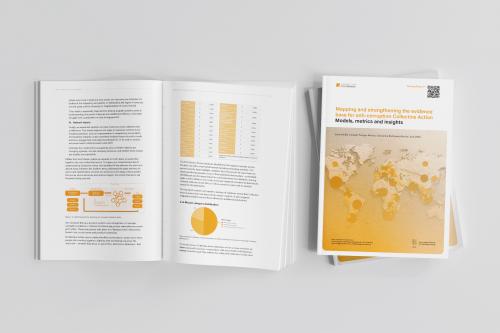How mushroom sites and disinformation stand in the way of combating corruption in Bulgaria

How does the media influence public discourse on corruption and anti-corruption? And how can we ensure information integrity in an age of disinformation, propaganda, fake news and hybrid attacks?
To answer those questions in the context of Bulgaria, Sensika, a global media monitoring and analytics firm, processed more than 44 million articles in Bulgarian online media outlets and more than 20 million Facebook posts and comments on corruption and anti-corruption topics between January 2023 and February 2024.
The research report – an update of similar research in 2021–2022 – supports the Basel Institute's technical assistance programme with the Bulgarian Government and was funded by the Swiss Agency for Development and Cooperation (SDC) and the United States Agency for International Development (USAID).
This comprehensive examination offered us valuable perspectives on the media’s role in shaping public opinion on governance and integrity. The findings underpin the importance of smart government communication and the informed and critical consumption of information by citizens. The research methodology employed AI technologies and was bolstered by human interventions for accurate trend spotting, sentiment analysis and deep-dive content monitoring. A short summary is below.
Corruption is headline news; integrity less so
Between 2023 and early 2024, both corruption and anti-corruption narratives received sustained attention and coverage. This contrasts with 2021–2022, when corruption-related narratives attracted more media attention than news on anti-corruption efforts. Interesting findings include:
- Comments on Facebook often outnumbered original posts. Even allowing for the activities of trolls and bots, this suggests a reactive audience keen to discuss these issues.
- Corruption-related keywords saw sustained interest in terms of both volume and reach, a finding consistent with our recent public opinion research indicating corruption as one of citizens’ top three concerns.
- Integrity-related keywords had a more limited reach, suggesting that users are more interested in narratives exposing wrongdoing than in those highlighting virtue.
Disinformation via mushroom sites and social media
In the context of anti-corruption as well as in general, disinformation and fake news have far-reaching negative implications: distorted information space, manipulated public opinion, amplified divisions and polarised societies.
This makes the job of anti-corruption practitioners and government officials extremely challenging, as they try to devise smart communication strategies to counter these trends and promote informational integrity on corruption and anti-corruption topics.
As the research points out, hybrid attacks flood the public discourse with large volumes of manipulative content.Disinformation is spread by seeding superficial news stories and narratives in mushroom websites and amplifying them on social media via armies of trolls and bots.
Mushroom websites are impostor online media outlets, designed to provide anonymity and plausible deniability for their creators. They are created in bulk by malicious actors to seed disinformation, propaganda and fake news. During disinformation campaigns, they “pop up, multiply and grow” in a coordinated manner. Afterwards they either disappear or become inactive until the next campaign.
Social media platforms amplify what mushroom sites publish. Trolls and bots, using fake user profiles, share disinformation, propaganda and fake news across different social networks to artificially boost engagement metrics. This way they trick the platforms’ algorithms and make the content look organically viral.
As a result, many social media users suffer increased cognitive vulnerability. The increased consumption of news through social media and mobile devices has led to more unconscious behaviour, meaning more impulsive reactions to media content that reinforces their existing beliefs. Often users distribute disinformation and fake news without reading beyond the headlines or checking the source.
What does this look like in Bulgaria?
Bulgaria is no stranger to malign forces seeking to disrupt the integrity of the public information space for private gain. It is also no stranger to destructive smear campaigns that aim to slander, defame and silence reformers.
Last year, for example, a well-orchestrated malicious campaign was executed through hundreds of mushroom sites against then Minister of Justice Krum Zarkov, an outspoken voice for anti-corruption legislative reforms. The smear campaign falsely accused Minister Zarkov of strangling cats and eventually necessitated a public rebuttal.
This year’s research also observed apparently coordinated disinformation campaigns in both online media outlets and Facebook. Mushroom websites published sensationalist content about notable individuals. Suspicious Facebook users, potentially trolls, posted similar or identical comments under different posts in a limited time frame. It is not unlikely that this amplification of sensationalist narratives influenced public perception and discussion around corruption- and anti-corruption issues.
Corruption and sensationalism
Coverage of corruption-related narratives in Bulgarian online and social media illustrates the significance of corruption as a critical issue, with continued exposure of scandals across various domains. These narratives reveal systemic concerns within the governmental, judiciary and law enforcement sectors. They not only achieved impressive media coverage volume but also reached extensive audiences, underscoring the gravity of corruption as a key societal issue – a point confirmed by our public opinion research.
Legitimate media, mushroom websites and media aggregators play distinct roles in disseminating corruption-related content:
- Social media platforms drive traffic to mushroom websites and media aggregators. In Bulgaria, Facebook plays an outsized role in referring users to mushroom sites.
- Legitimate media provide a steady stream of articles, often using indirect language to discuss corrupt practices.
- Mushroom websites amplify particular corruption-related events and disseminate biased or selective news with often sensationalist undertones.
- Aggregators broaden the content’s reach.
The good news: anti-corruption discourse is also strong
Our research showed the steady presence of anti-corruption keywords in legitimate online media, with peaks around specific events like new legislative measures, government actions or high-profile corruption cases.
Constitutional anti-corruption reforms and the enactment of a new Anti-Corruption Law in 2023 saw significant media coverage. The dismissal of Chief Prosecutor Ivan Geshev and the introduction of a legal mechanism for investigation and criminal liability of the position of Chief Prosecutor incited widespread media debate on the need for increased governance accountability and transparency. The topic was actively discussed on Facebook, amplifying public engagement on issues of governance and justice.
Bulgaria’s aspirations to join the OECD were another subject of media attention, signifying a dedication to bolstering good governance frameworks in line with international standards. This was also exemplified by coverage of the implementation of the Whistleblower Protection Act.



